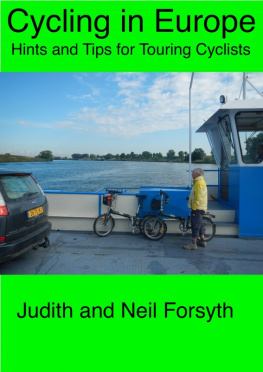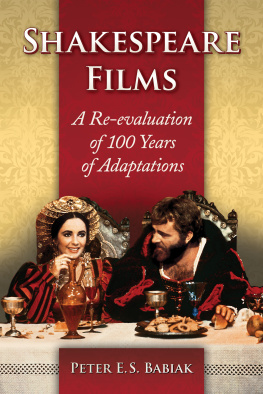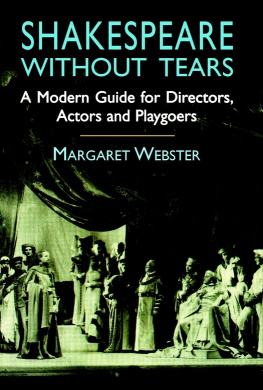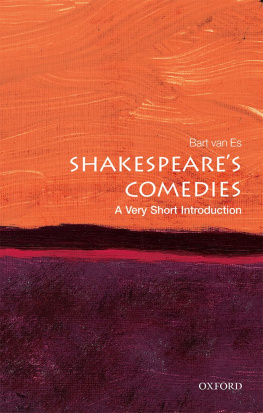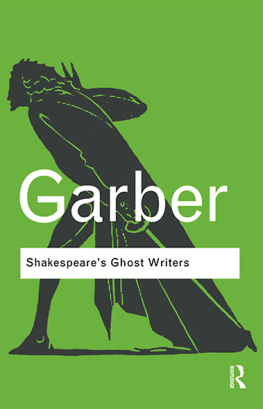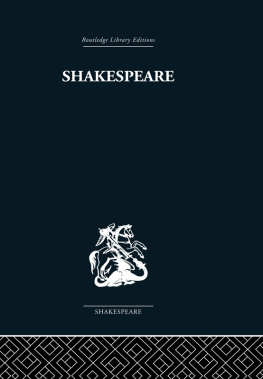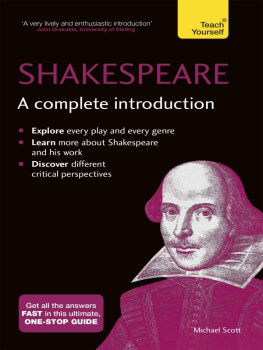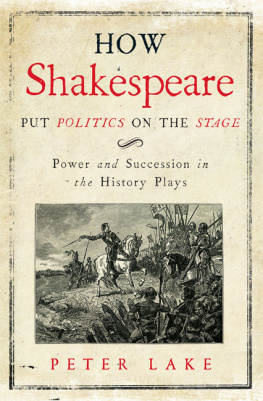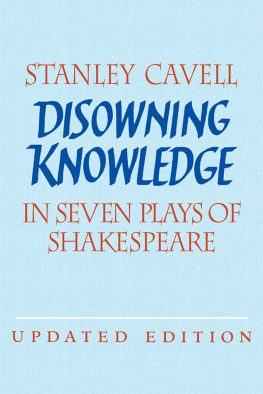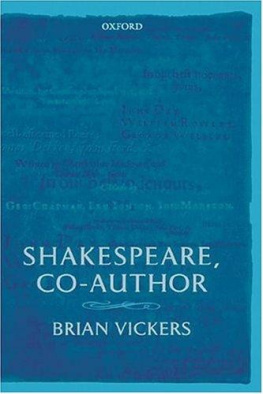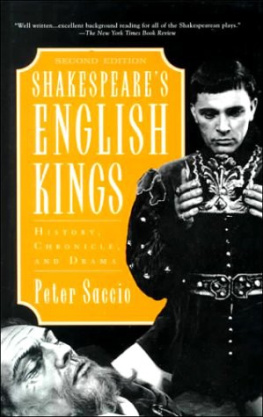SHAKESPEARE THE ILLUSIONIST
SHAKESPEARE THE ILLUSIONIST
MAGIC, DREAMS, AND THE SUPERNATURAL ON FILM
NEIL FORSYTH
OHIO UNIVERSITY PRESS
ATHENS
Ohio University Press, Athens, Ohio 45701
ohioswallow.com
2019 by Ohio University Press
All rights reserved
To obtain permission to quote, reprint, or otherwise reproduce or distribute material from Ohio University Press publications, please contact our rights and permissions department at (740) 593-1154 or (740) 593-4536 (fax).
Printed in the United States of America
Ohio University Press books are printed on acid-free paper

29 28 27 26 25 24 23 22 21 20 19 5 4 3 2 1
Library of Congress Cataloging-in-Publication Data
Names: Forsyth, Neil, 1944- author.
Title: Shakespeare the illusionist : magic, dreams, and the supernatural on film / Neil Forsyth.
Description: Athens : Ohio University Press, 2019. | Includes bibliographical references and index.
Identifiers: LCCN 2018045766| ISBN 9780821423363 (hc : alk. paper) | ISBN 9780821446478 (pdf)
Subjects: LCSH: Shakespeare, William, 1564-1616--Film adaptations. | Dreams in motion pictures. | Illusion in motion pictures. | Supernatural in motion pictures. | Film adaptations--History and criticism.
Classification: LCC PR3093 .F67 2019 | DDC 791.43/6--dc23
LC record available at https://lccn.loc.gov/2018045766
CONTENTS
ACKNOWLEDGMENTS
A lot has happened in the Shakespeare and Film world since I started writing this book. New films of Macbeth, for one thing, keep appearing, and good books too. I have learned much from the work of friends and colleagues with whom I have tried out ideas or discussed some of the filmsI think especially of Pascale Aebischer, Judith Buchanan, Samuel Crowl, Lukas Erne, Jos Ramn Daz Fernndez, Matthias Heim, Russell Jackson, the late Kenneth Rothwell, Katherine Rowe, and Richard Waswo. SomeoneI cannot recall whohappily alerted me to Jenny Sagers recent book, which covers some of the same ground in film studies and early modern theatre, even though her focus is not on Shakespeare but on Robert Greene. I am grateful to the others who have helped me keep up: friends and colleagues such as Indira Ghose, Elizabeth Kaspar (who carefully read the whole manuscript), Anna Swrdh, Digby Thomas, and Margaret Tudeau-Clayton (whose casual remark launched the whole enterprise). These (mostly) kind people have not always agreed with what I claim in this book, and none of them is responsible for the views, heretical or otherwise, expressed. But it is very pleasant to write down their names and think about each one as I do so. I am also grateful to the readers at Ohio University Press whose careful and detailed responses I have tried, where possible, to incorporate into the final draft of this book. Jacqueline Frey and her colleagues at the Centre Informatique in Lausanne labored long to help me cope with what seemed suddenly like an insurmountable computer problem. Christophe Metzger, also at the CI, has always been willing to help.
Parts of certain chapters were published in the Cambridge Companion to Shakespeare on Film, in Shakespeare et le cinma, in the Paris-based tudes Anglaises, in a festschrift for a colleague, and in the Wadsworth edition of Macbeth. I am grateful for permission to reuse them, although they have undergone considerable changes since their first appearance.
INTRODUCTION
From Stage to Screen
IF SHAKESPEARE WERE alive today, he would be writing screenplays. This remark, or something like it, has often been attributed to Sir Laurence Olivier. Barbara Hodgdon says that her colleague Jim Burnstein credits his teacher, Russell Fraser, but she allows that Olivier was probably the first to remark that if Shakespeare were around now he would be writing new television comedies or soap opera parts for aging actors. Certainly by the late 1960s or early 1970s, the idea that Shakespeare wrote cinematically was circulating in academic culture, spawning courses titled Shakespeare on Film or (eventually) Shakespeare and Film.
Julie Taymors film of Titus Andronicus opened in December 1999. In the first sentence of his New York Times review, Jonathan Bate offered a slightly different version of the remark but without attribution: If William Shakespeare were alive today, he would be writing and directing movies.Palamon (1998), a ten-minute Vimeo version of The Two Noble Kinsmen, a play Shakespeare cowrote with John Fletcher that had not been filmed before. Adaptations in languages other than English flourish around the globe, such as Grigori Kozintsevs Russian films of Hamlet (1964) and King Lear (1970); Akira Kurosawas three Japanese films Throne of Blood (1957, loosely based on Macbeth), The Bad Sleep Well (1960, Hamlet), and Ran (1985, King Lear); and even ric Rohmers Conte dhiver (1992, The Winters Tale), in the course of which the heroine sees a representation of Shakespeares play and changes her life.
Anticipating the success of their Midsummer Nights Dream (1935), Warner Brothers made an eccentric twenty-minute promotional film in which a screenwriter falls asleep and visions appear. Hamlet, for example, performs a jazzy dance sequence backed by a group of Hamlettes. Finally Shakespeare himself appears, asking, Is it for this that I spilled so much magic ink? and Hamlet concludes, Today the screenplay is the thing. In contrast, Stan Hayward, writer of short films like Small Talk and When Im Rich and of the television cartoon series Henrys Cat, made the following deliberately contrarian statement:
For certain Shakespeare would not have gone into TV. Writing for TV is not very creative, and is bogged down in all sorts of conditions about budgets, deadlines, legal issues, screen slots, and global distribution, apart from the fact that TV is often written by teams, and for certain will have much altered by the time it reaches the screen. Very few authors become screenwriters, though they may sometimes be consultants. Though Shakespeares work is well suited to Box Office movies, he would probably find the theater and radio more satisfying.
Another critic, Alja Krivec, writes on the same website, Maybe he wouldnt even be an artist. Perhaps he would seek his potential in venture capitalism, since he was kind of a businessman too, or maybe he would be the head of the BBC?
The aim of this book is not to offer another answer to the question of whether Shakespeare would have written for the screen if he were alive today (though I think he would) or even whether he would have become the head of BBC drama but rather to assess what various filmmakers and television directors have in fact made of his playsat least, of those that contain major ingredients of the supernatural such as ghosts, witches, and fairies. That is a very different question from what Shakespeare himself would have done, though his presence obviously haunts all these films, even those that try the hardest to leave him behind.
The ways in which each text was trimmed and restructured offer important clues to how each director approached his or her Shakespearean material. Length is an important film convention: most films are between 90 and 130 minutes long. Most screenplays for Shakespeare films therefore provide at best only some 50 percent of the original plays (the famous line in the prologue to Romeo and Juliet


